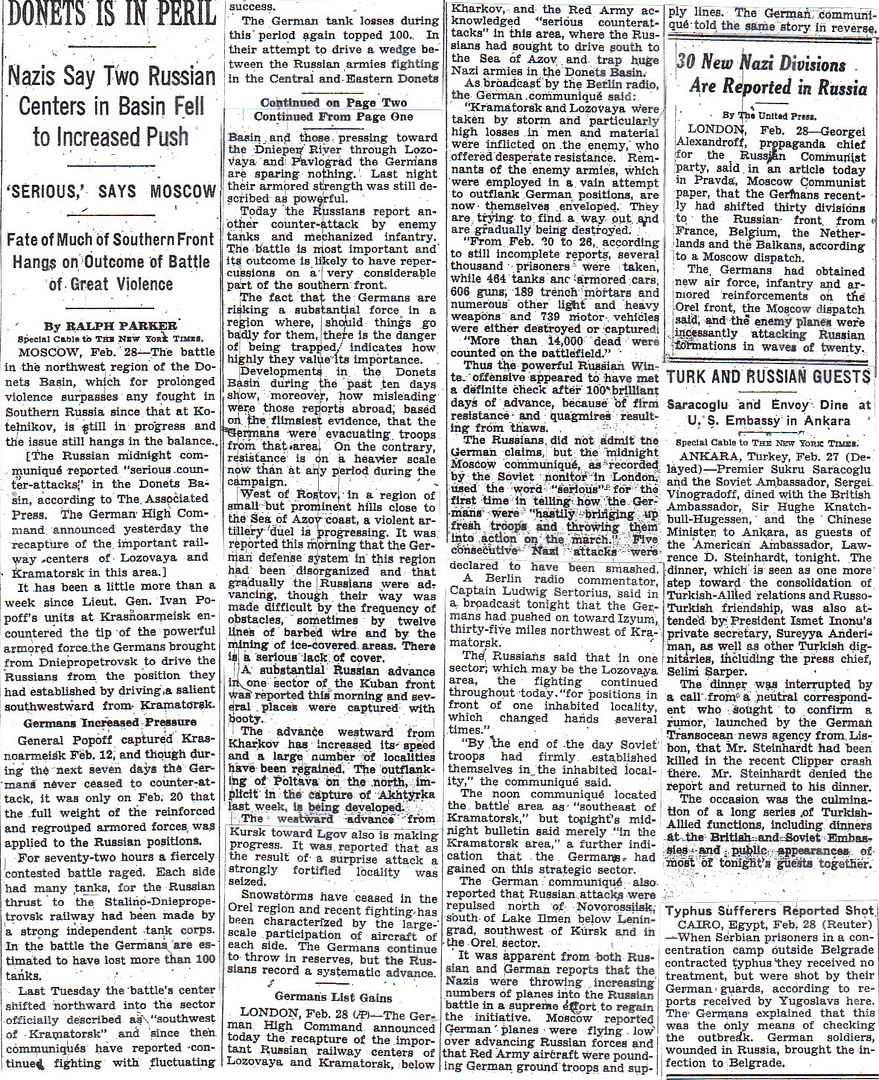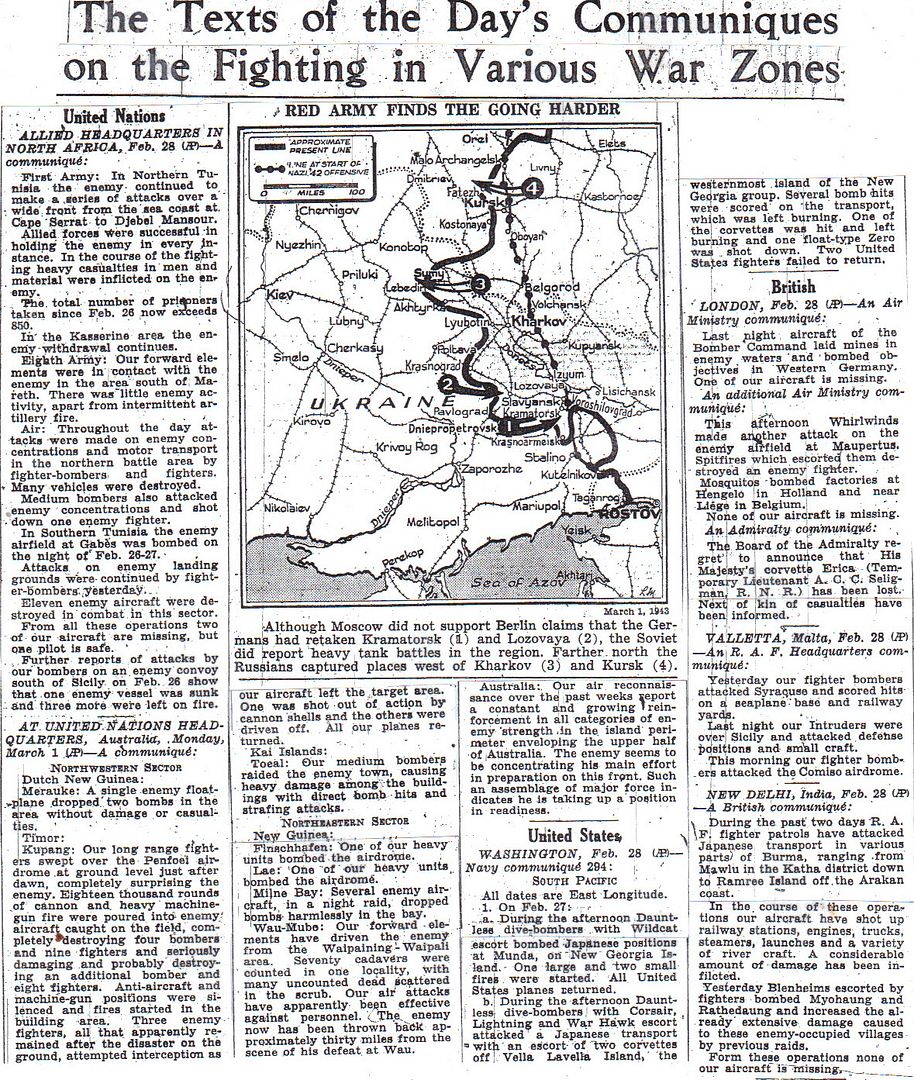
Posted on 03/01/2013 4:39:52 AM PST by Homer_J_Simpson










http://www.onwar.com/chrono/1943/mar1943/f01mar43.htm
Soviet forces take Demyansk
Monday, March 1, 1943 www.onwar.com
On the Eastern Front... North of Moscow, a Red Army attack captures the significant town of Demyansk.
In Burma... The Chindit force is making slower than expected progress because. In part, this is the result of a concern for finding clearings for supply drops. It is later discovered that it is possible to recover supplies in jungle areas.
http://homepage.ntlworld.com/andrew.etherington/frame.htm
March 1st, 1943 (MONDAY)
UNITED KINGDOM: Soviet envoys tell the Polish government in exile that the USSR intends to keep eastern Poland, which it invaded in 1939.
A year after “Austerity” was introduced, the population of Britain has reduced its annual consumption to four-fifths of its peacetime level, although incomes are up by over 50% since 1938. Rationing, high taxes and shortages have bitten deep into the average family’s way of life. While expenditure on food, clothing and travel has fallen in real terms, that on drink and tobacco has doubled.
“Utility” production applies not only to clothing and furniture but also to many household goods. Only white crockery is being made and this year’s plain white cups are usually without handles to save material. Licensed manufacture permits only one standard quality of sheets, blankets, pots and pans, kettles and electrical appliances, carpets and linoleum, pens and pencils, lighters and umbrellas. “Fripperies” such as soup spoons and butter knives and ornamental glassware are banned. Toys cannot include rubber, hemp, cork, celluloid or plastic.
Shortages have driven many goods “under the counter” - notoriously cigarettes of all popular brands, vacuum flasks, combs, hair grips, needles, safety pins, babies’ teats, lipstick and cosmetics, alarm clocks, prams and bicycles. Shortage of newsprint means that national papers are reduced to four pages on several days of the month.
The ministry of food’s rhyming exhortations continue - “Don’t you know the sight of peelings greatly hurts Lord Woolton’s feelings?” Wartime sausages have been dubbed “breadcrumbs in battledress”. There are recipes for carrot jam and nettle tea. Unloved dried egg has encouraged people to keep chickens and two million families are self-sufficient in vegetables thanks to “digging for victory” in gardens and allotments.
Rescue tug HMS Vagrant launched.
Sloop HMS Kite commissioned. (Dave Shirlaw)
GERMANY:
U-299 laid down.
U-842 commissioned. (Dave Shirlaw)
ITALY: GENIERE, RM, Italian Destroyer. Sunk in dry dock at Palermo by USAAF air raids
MONSONE, RM, Italian Destroyer. Sunk in Naples harbour by USAAF air raids
(James Paterson)
U.S.S.R.: Russian troops resume the offensive North of Moscow. Soviet troops re-capture Demyansk, Zaluchie and Lychkovo.
BURMA: Myitkyina: A new Burma road, to take material to Chiang Kai-shek’s Nationalists, has just been completed. Two Chinese divisions which had retreated into India, the 22nd and 38th under the command of Chiang Kai-shek’s hard-boiled US chief of staff, Lieutenant General “Vinegar Joe” Stilwell, pushed up from Ledo, 275 miles through Hukawng Valley and the Pangsan Pass, to Myitkyina, on the frontier with China.
In three months Stilwell’s divisions killed 4,000 Japanese. They were followed by US Army engineers and 15,000 labourers. Since the original Burma Road was cut by the advancing Japanese early in 1942, the Nationalists have not been isolated. For nearly a year US pilots have flown an air bridge from Dinjan, near Ledo, across the Himalayan foothills into Yunnan. It was a dangerous journey, with planes buffeted by turbulent air currents and pilots suffering snow-blindness and crashing. Yet so successful was the air bridge that it carried more supplies than the original Burma Road.
CANADA: Dive tenders DT 2, 3, 4 ordered for RCN.
AMC HMCS Prince David arrived Burrard Drydock for conversion to infantry landing ship. (Dave Shirlaw)
U.S.A.: VMB-413 is the first Marine PBJ squadron formed. Commissioned at Marine Corps Air Station (MCAS) Cherry Point, North Carolina. (Jack McKillop)
Washington: The Atlantic Convoy Conference, which opened here today, is deciding the strategy for combating the continuing U-boat menace in the North Atlantic. Losses have mounted because of the increased number of U-boats, the deployment of “milch cow” submarines so that the U-boats can refuel while on patrol, and the shortage of very-long-range aircraft. From 1 April the Royal Navy and the Royal Canadian Navy are to share the escort of convoys on the North Atlantic route, with a dividing line at 47 degrees west, while the US Navy will cover the South Atlantic and Caribbean.
Aircraft carriers USS Ticonderoga and Kearsarge laid down.
Destroyer escorts USS Cates, Gandy and Lee Fox laid down. (Dave Shirlaw)
A revision of the squadron designation system changed Inshore Patrol Squadrons to Scouting Squadrons (VS), Escort Fighting Squadrons (VGF) to Fighting Squadrons (VF), Escort Scouting Squadrons (VGS) to Composite Squadrons (VC) and Patrol Squadrons (VP) operating land type aircraft to Bombing Squadrons (VB). This revision also redesignated carrier Scouting Squadrons (VS) as VB and VC and as a result the types of squadrons on Essex Class carriers was reduced to three. In spite of this change, the aircraft complement of their Air Groups remained at its previous level of 21 VF, 36 VSB and 18 VTB. (Massimiliano Stola)
ATLANTIC OCEAN: Between 28 Feb and 2 Mar, 1943, U-518 attacked Convoy BT-6, which was escorted by the Brazilian escort vessels Carioca, Caraveles and Rio Branco, several times and reported one ship sunk, six missed shots and eight duds or deep-running torpedoes. At 0330 on 1 March, lookouts on the Fitz-John Porter in station #14 spotted one torpedo coming from the starboard beam and cross the bow by a few feet. Later another torpedo missed the stern by about 25 yards. At 0652, a third torpedo struck on the port side at #5 hold. The explosion blew large holes in the ship at the waterline on both sides, demolished the after gun mount, severed the main shaft and completely destroyed the #5 hold. The eight officers, 30 men and 17 armed guards (the ship was armed with one 3in and five 20mm guns) abandoned ship in four lifeboats and one raft in good order. One armed guard, sleeping on #5 hatch was blown overboard and was not seen again. The Liberty ship sank sometime during the night of 2 March. The Brazilian minelayer Carioca picked up the survivors within two hours after the attack. One hour later they were transferred to a Brazilian freighter and landed in Recife, Brazil. (Dave Shirlaw)
"Not nearly enough was done to rescue the Jews during the Holocaust.
Yet, whereas governments, churches, and international conferences failed to stop the Nazis from murdering six million people, thousands of individuals did effectively act to save Jewish lives.
"Ordinary people of all backgrounds defied the dangers to come to the aid of persecuted Jews.
Rescue efforts were geographically diverse, and the degree of difficulty involved also varied.
Rescuers' activities were influenced not only by the extent of Nazi control of an area, but by hostile or sympathetic attitudes of native populations.
"Moreover, not all rescuers acted from moral conviction.
Some offered aid only in exchange for exorbitant fees.
"Rescue operations in Occupied Western Europe, particularly in Denmark, Belgium, France, and Italy, succeeded in saving substantial portions of the respective nations' native Jewish communities.
Danish citizens organized fishing-boat flotillas that helped almost all of the country's Jews escape to neutral Sweden.
In France, a variety of groups and individuals rescued some 7,000 children, smuggling many into Switzerland and Spain.
Involved were Protestant and Catholic church leaders and peasants as well as the Jewish child care organization Ouvres de Secours aux Enfants and the Jewish scouting organization Éclaireurs israélites de France.
Director Germaine Le Henaff (pictured) hid several Jews in the Chateau de la Guette children's home.
"The underground French organization Circuit Garel rescued many children from Nazi transit camps and hid them in foster homes.
The villagers of Le Chambon-sur-Lignon in Vichy France provided safe haven for thousands of Jews until members of the Resistance could guide them into Switzerland.
"In Eastern Europe, more direct German rule along with violently antisemitic attitudes created even greater obstacles to the rescue of Jews.
Little organized aid was extended in Poland, although thousands of individuals helped Jews, particularly in Warsaw during 1942-43.
The few groups offering support included the Catholic Scout movement as well as Zegota (Council for Aid to Jews).
Some within the Polish Catholic Church urged rescue of Jews.
In Lvov, Leopold Socha hid 21 Jews within the city's sewer system.
"A number of international organizations, including the American Jewish Joint Distribution Committee, the World Jewish Congress, and the War Refugee Board, supported both overt and clandestine actions in order to save as many Jews as possible.
They established secret contacts with Jewish communities in Occupied Europe, exchanged vital information, arranged crucial funding, organized emigration schemes, and abetted escape attempts.
"Raoul Wallenberg, a member of the Swedish legation in Hungary, issued protective passports and secured life-saving shelter, food, and medicine for thousands of Hungarian Jews.
Thousands of other quiet yet indispensable heroes--ranging from farmers and laborers to teachers and factory owners (such as Oskar Schindler)--fooled the Gestapo and concealed and protected Jews."
"Miriam Szyfman-Fainer and Moyshe Koyfman, members of the Bund, stroll through the streets of the Warsaw Ghetto.
The Bund was a Jewish Socialist organization that had loose but cordial ties with the general Socialist movement in Poland.
In the ghettos of Poland, members of the Bund were deeply involved in the Resistance movements.
Szyfman-Fainer and Koyfman both perished in the Warsaw Ghetto uprising."
"With barbed wire strung across its top, the Vilna gate separated the ghetto from the rest of the city.
The Germans established two ghettos at Vilna in September 1941, but they moved within weeks to liquidate the smaller of the two, whose members did not have a Schein (work permit).
For about a year, beginning in spring 1942, there were no major deportations, as the ghetto residents sought to ensure their survival by producing goods for the German war effort.
This drawing by Z. Weiner dates from 1942-43."
"A parade of doomed souls stretches toward the gas chambers of Auschwitz-Birkenau.
Exhausted by their endless journeys from distant towns and villages, trainloads of victims arrived to face Josef Mengele, whose flick of a finger meant life or death.
French Resistance member Charlotte Delbo, imprisoned at Auschwitz, described the station as a place where arrival and departure became synonymous."
To add to your list of today’s events:
Rabaul: A Japanese convoy of eight transports and eight destroyers carrying troops and equipment bound for Lae set sail today.
More on this tomorrow, and especially on Sunday.
The Germans are abadoning the Demyansk Pocket, which was held for a year after the Soviet 1941 Winter Offensive left it exposed and isolated. For a time, the 100,000 troops of Army Group North were supplied, successfully, by air. It was the success of this operation that caused Goring to promise, and Hitler to believe, that Stalingrad could likewise be supplied by air. However, the Demyansk Pocket no longer serves a strategic purpose, and the Germans need those troops elsewhere. As part of his temporary more realistic appraisal of the Eastern Front, Hitler allows the pocket to be abandonded. He will make a similar decision regarding the 9th Army’s position in the Rzhev salient later this month.

The good Christian people of Denmark were outraged by what the Nazis were doing to the Jews of Europe. They hatched an audacious scheme to hide and move the Jews to the coast, and then over a few days take the Jews of Denmark to Sweden in the middle of the night in a fleet of boats. And they pulled it off. Almost the entire Jewish population of Denmark survived the war.
For any of you who are admirers of Jascha Heifetz, that would be all but his immediate family of the Vilna Heifetzes behind the barbed wire of the Vilna ghetto, awaiting their murders.
Thanks! Some samples of Heifetz's work:
Disclaimer: Opinions posted on Free Republic are those of the individual posters and do not necessarily represent the opinion of Free Republic or its management. All materials posted herein are protected by copyright law and the exemption for fair use of copyrighted works.